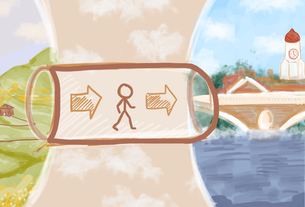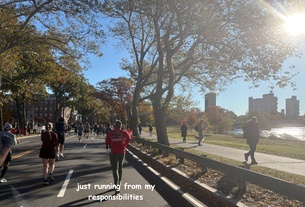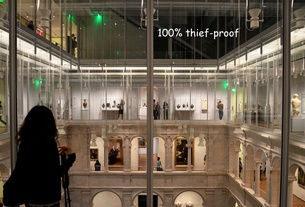Students crowded around televisions, and some even turned down dates, to catch a glimpse of a British quartet’s first performance on American television on February 9, 1964. Within days, all the record stores in the Square had sold out of their first shipments of their record, and at the COOP, the shipment of 40 was gone overnight. The Beatles took not only America, but also Harvard and the Square.
“You haven't heard of the Beatles yet? Go back to Lamont, wonk,” reads one article in the Crimson from 1964.
“The Beatles sort of eclipsed anything people were accustomed to listening to, and this was very much their selected music for parties, for dances, for whatever,” Dean of Freshmen Thomas A. Dingman ’67, who was a freshman at the College at the time, said.
THAT’S ALL FOLK
Though the Beatles craze eventually caught on, Beatlemania was slow to spread through Harvard.
Michael A. Lerner ’65, a former Crimson editor, remembered in an email, a political world in which he lived and breathed The Crimson, and in which reporting on President Kennedy’s assassination, and writing op-eds on the Vietnam War was the focus. The world at Harvard, at least for the moment, did not revolve around the emergence of rock and roll.
Dingman remembered that “the music scene in the Square seemed to be around Club 47 [now Club Passim] which was largely about folk music.”
Merry W. Maisel ’62, who had been the folk music director for Harvard’s radio station WHRB, said that “folk music was the hottest stuff. That’s what was advanced, and [everyone] was a folk music fan. And so we had folk ‘music orgies’ in the studios [on Dudley street] and all the folk music singers in town would come and sing.”
“I remember Joan Baez sitting in a booth in a sandwich shop near me. I remember Andy Beyer [a former Crimson editor] playing the Righteous Brothers’ ‘You’ve Lost that Lovin’ Feelin’,’ and asking me to listen carefully, which I did,” Lerner wrote.
Maisel had graduated by the time the Beatles became popular on campus, but she recalls their less than positive reception at first. “The folks in Cambridge, at the Harvard radio station… thought the Beatles were horrid! In fact, I remember a friend of mine calling me up and saying ‘Beyettles!’ And I said what? And he said ‘Beyettles!’ And I said I’ve never seen or heard of them.”
She reflected that the Beatles’ initial Harvard reception is now surprising. “Harvard was as affected by the ’60s as any other place, and more so,” Maisel said. “And therefore the Beatles whom all these people now agree were the greatest musical innovators of the century should have had a better reception from us.”
THE BEATLES BREAK THROUGH ON ED SULLIVAN
The Beatles’ breakthrough happened the night of Sunday, February 9, 1964. Many viewing parties on Harvard’s campus were reported, including one where about twenty Crimson editors gathered in The Crimson's Sanctum to watch the Ed Sullivan Show.
Dingman recalled that the premiere was a momentous event. “All sorts of people who weren’t used to watching television were planning to see them on the Ed Sullivan show,” Dingman said. “You sort of picked up their songs everywhere you were going.”


